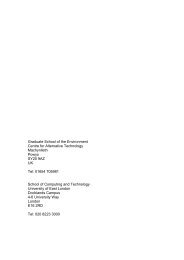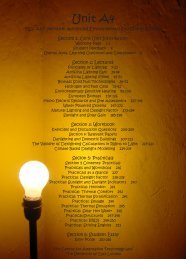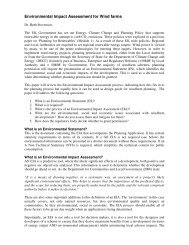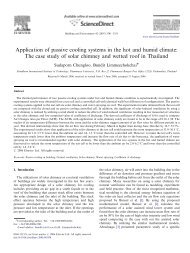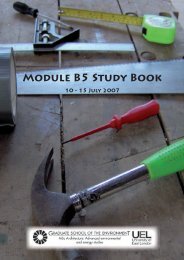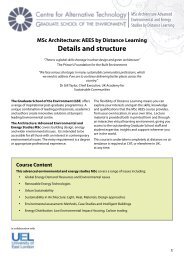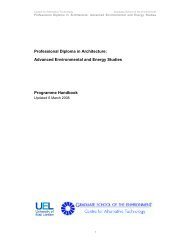Module B1 Study Book - the Graduate School of the Environment
Module B1 Study Book - the Graduate School of the Environment
Module B1 Study Book - the Graduate School of the Environment
Create successful ePaper yourself
Turn your PDF publications into a flip-book with our unique Google optimized e-Paper software.
with some coal in Europe, Asia, and North America). With <strong>the</strong> advent <strong>of</strong> oil<br />
however, humanity started living <strong>of</strong>f our planet’s ‘sunlight-reserves’. We had<br />
discovered a massive energy “bank account”. A single day’s oil consumption<br />
now represents a line <strong>of</strong> barrels long enough to encircle <strong>the</strong> earth.<br />
We also discovered we could use oil for plastics and chemicals too, so it has<br />
become indispensable to almost every aspect <strong>of</strong> Welsh life. It’s not just food,<br />
it’s also drinking water, home heating, manufacturing, communications and<br />
personal transport, and that’s just <strong>the</strong> start.<br />
So, how on earth can we Britain begin to reduce our excessive and addictive<br />
use <strong>of</strong> fossil fuels in order to converge with <strong>the</strong> majority world at some<br />
global fair share? The path I am suggesting is one <strong>of</strong> ‘Powerdown plus<br />
Renewables’.<br />
Powerdown<br />
We are energy obese; we use far more energy than is good for us. So much<br />
so that we have to spend even more energy driving to special places where<br />
special machines use yet more energy to give us <strong>the</strong> exercise to keep our<br />
bodies working properly. Richard Heinberg’s original concept <strong>of</strong> ‘Powerdown’<br />
is a sane response to humanity’s increasingly grave problems. Powerdown<br />
is not <strong>the</strong> same as energy efficiency: it goes very much fur<strong>the</strong>r. We drive<br />
an oil powered machine to plough <strong>the</strong> land, and ano<strong>the</strong>r to plant <strong>the</strong> seed.<br />
We <strong>the</strong>n use fertilisers and pesticides made with oil, and irrigate with water<br />
pumped by oil. We harvest <strong>the</strong> crop with oil-powered tractors and process<br />
it with fossil-fuelled electrical equipment. Finally it is packed in plastic and<br />
driven fur<strong>the</strong>r than you ever imagined. The bottom line is that we eat ten<br />
calories <strong>of</strong> fossil fuel energy for every calorie <strong>of</strong> food we consume. Switching<br />
to a locally sourced, mostly organic, less-processed, low-meat diet will not<br />
only increase our general health and well being, it can massively reduce <strong>the</strong><br />
fossil fuel dependence <strong>of</strong> our eating habits.<br />
The potential powerdown which could be achieved through a re-think <strong>of</strong> our<br />
food alone is massive. For starters, we export some 102,000 tones <strong>of</strong> lamb to<br />
<strong>the</strong> EU, whilst also importing 125,000 tonnes from <strong>the</strong> EU. Similar paradoxes<br />
exist for most o<strong>the</strong>r products. Local food chains are not only more energy<br />
efficient, <strong>the</strong>y are considerably more reliable. But could we still feed ourselves<br />
if oil became expensive and scarce? With a re-think, many people believe we<br />
could. Firstly it would require a change <strong>of</strong> diet, but that’s something we need<br />
to do in any case. Secondly supermarkets reject around 30% <strong>of</strong> vegetables<br />
because <strong>the</strong>y are <strong>the</strong> wrong shape, colour or size. Fur<strong>the</strong>r waste occurs<br />
when food is processed into ready meals. Finally, consumers bin about 30%<br />
<strong>of</strong> what <strong>the</strong>y buy. If we stopped this wastage <strong>the</strong>n we could be far more selfreliant<br />
in food and vastly reduce <strong>the</strong> oil needed to provide it.<br />
Above <strong>the</strong> basic level needed to provide food, clo<strong>the</strong>s and shelter, using<br />
extra energy does not necessarily make us any happier. Since <strong>the</strong> 1970s <strong>the</strong><br />
UK’s GDP has doubled, but our perceived ‘satisfaction with life’ has hardly<br />
changed. We’re suffering from Affluenza. This infectious disease is straining<br />
Lecture: Energy futures 15




